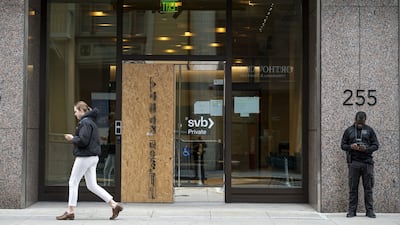Global financial stocks have lost $465 billion in market value so far as investors cut exposure to lenders from New York to Japan following the collapse of Silicon Valley Bank.
Losses widened early on Tuesday, with the MSCI Asia Pacific Financials Index dropping as much as 2.7 per cent to the lowest since November 29.
Mitsubishi UFJ Financial Group slid as much as 8.3 per cent in Japan while South Korea’s Hana Financial Group fell 4.7 per cent and Australia’s ANZ Group Holdings lost 2.8 per cent.
The declines came after US peers tumbled, with investors questioning whether a government rescue plan for the banking system would prevent more fallout from SVB’s demise.
Asian lenders have been seen as more insulated from direct risk.
The combined market capitalisation of the MSCI World Financials Index and MSCI EM Financials Index has dropped about $465 billion in three days.
Major northern Asia banks mostly have “minimal risk of the sudden run on deposits that crumpled Silicon Valley Bank” given their solid deposits, asset mixes and liquidity, Bloomberg Intelligence analyst Francis Chan wrote in a note.
“Smaller lenders may harbour liquidity and credit risks that could easily be overlooked.”
There are still concerns that financial companies could see an impact from their large investments in bonds and other financial instruments amid the SVB-induced turmoil.
Two-year Treasury yields registered their largest one-day drop since the early 1980s on Monday amid expectations the Federal Reserve will hold off raising interest rates due to recent turmoil in the banking system.
“We need to assess the likelihood of an economic hard landing in the US and odds of a pivot on interest rates by the Fed,” said Michael Makdad, an analyst at Morningstar.
“If these things do not happen, today’s move in Japanese financial stocks looks like an overreaction to me.”

